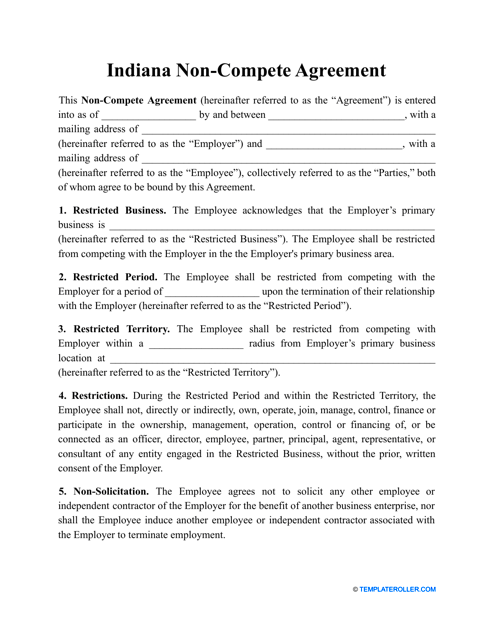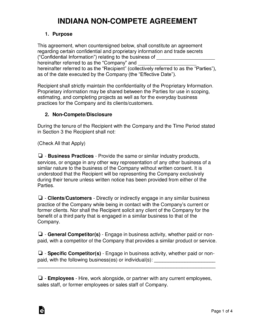A Guide to Indiana Non-Compete Laws
Non-compete laws in Indiana play a crucial role in protecting businesses while also considering the rights of employees. These laws regulate the agreements that restrict employees from working for competitors after leaving a job. Understanding these laws is essential for both employers and employees to ensure they are compliant and protected. In this post, we will explore the details surrounding non-compete agreements, their enforceability, and key provisions specific to Indiana.
Understanding Non-Compete Agreements

A non-compete agreement is a contract between an employer and an employee that limits the employee’s ability to work in a similar field after leaving the company. Here are some important aspects to consider:
- Purpose: The main goal of these agreements is to protect a company’s trade secrets and confidential information.
- Scope: Non-compete agreements typically outline geographical limits, duration, and the type of work that is restricted.
- Mutual Agreement: Both parties must willingly agree to the terms for the contract to be enforceable.
While these agreements can be beneficial for employers, they can also restrict an employee’s ability to find new job opportunities, which is why understanding their implications is essential.
Key Provisions of Indiana Non-Compete Laws
Indiana non-compete laws have specific provisions that determine how and when these agreements can be enforced. Here are some key provisions:
- Reasonableness: The restrictions in the agreement must be reasonable in terms of time, geography, and the scope of restricted activities.
- Protectable Interest: Employers must demonstrate a legitimate business interest that needs protection, such as trade secrets or client relationships.
- Written Agreement: Non-compete agreements should be in writing and signed by both parties to ensure clarity and enforceability.
- Duration: Indiana courts generally accept non-compete agreements lasting up to two years, but longer periods may be challenged.
It’s essential for both employers and employees to understand these provisions to navigate the complexities of non-compete agreements effectively.
Enforceability of Non-Compete Agreements in Indiana
The enforceability of non-compete agreements in Indiana is influenced by several factors. Understanding what makes an agreement enforceable can help both employers and employees navigate potential disputes. Here’s what you need to know:
- Reasonableness Test: Indiana courts evaluate whether the restrictions in the agreement are reasonable. This includes examining the time period, geographic scope, and the specific activities restricted.
- Legitimate Business Interests: Employers must show that the non-compete agreement protects a legitimate business interest, such as trade secrets or unique client relationships.
- Clarity of Terms: The terms of the agreement should be clear and specific. Vague or overly broad terms may lead to unenforceability.
- Consideration: For a non-compete agreement to be valid, there must be consideration, meaning that the employee receives something of value in return, such as a job offer or specialized training.
If an agreement fails to meet these criteria, it may be deemed unenforceable, leaving employers vulnerable and employees with fewer restrictions on their job search.
Factors Affecting Non-Compete Agreement Validity
Several factors can influence the validity of a non-compete agreement in Indiana. Here are the most critical ones:
- Duration: A reasonable duration is typically considered to be between six months to two years. Longer durations may be scrutinized more closely by the courts.
- Geographic Scope: The area in which the employee is restricted from working should be relevant to the employer’s business interests. A restriction that is too broad may not hold up in court.
- Employee’s Role: The role and level of the employee can also affect the validity. Higher-level employees with access to sensitive information may be held to stricter agreements.
- Public Policy: Courts may consider whether enforcing the agreement would harm the public interest, such as reducing job opportunities.
Understanding these factors can help both parties negotiate fair and enforceable agreements that protect business interests without unnecessarily limiting employee freedom.
How to Draft a Non-Compete Agreement in Indiana
Drafting a non-compete agreement requires careful consideration to ensure it meets legal standards and protects both parties’ interests. Here are some tips for creating an effective agreement:
- Be Specific: Clearly outline the restrictions, including the duration, geographic area, and specific activities that are prohibited.
- Define Legitimate Business Interests: Identify and articulate the business interests that the agreement aims to protect. This may include trade secrets, proprietary information, or client relationships.
- Include Consideration: Ensure that the agreement includes something of value for the employee, such as a job offer or access to training. This is crucial for enforceability.
- Consult a Lawyer: It’s always a good idea to seek legal advice when drafting a non-compete agreement. A lawyer can help ensure the agreement complies with Indiana laws and is enforceable in court.
By following these guidelines, employers can create non-compete agreements that effectively protect their business while remaining fair to employees.
Challenging a Non-Compete Agreement in Indiana
Sometimes, employees may find themselves facing a non-compete agreement that they believe is unfair or unreasonable. Challenging such agreements can be daunting, but it’s important to know that it’s possible. Here are some steps and considerations for challenging a non-compete agreement in Indiana:
- Review the Agreement: Start by carefully reviewing the terms of the non-compete agreement. Look for any vague language, unreasonable restrictions, or lack of consideration.
- Gather Evidence: Collect evidence that supports your case. This could include information about your role, the reasonableness of the restrictions, and how they affect your ability to find work.
- Consult an Attorney: Seeking legal advice is crucial. An attorney experienced in employment law can help you understand your rights and the likelihood of successfully challenging the agreement.
- File a Lawsuit: If negotiations fail, you may need to file a lawsuit to contest the enforceability of the non-compete. Your lawyer can guide you through this process.
Ultimately, the outcome of a challenge will depend on the specifics of the agreement and the surrounding circumstances, so it’s vital to approach the situation informed and prepared.
Frequently Asked Questions about Indiana Non-Compete Laws
Understanding Indiana’s non-compete laws can raise many questions. Here are some common inquiries:
- Are non-compete agreements enforceable in Indiana? Yes, but they must be reasonable in terms of duration, geographic scope, and the activities restricted.
- How long can a non-compete last? Typically, non-compete agreements in Indiana should last no longer than two years.
- Can I negotiate the terms of a non-compete agreement? Yes, employees can negotiate the terms before signing the agreement to make it fair and reasonable.
- What happens if I violate a non-compete agreement? Violating a non-compete may lead to legal action from the employer, potentially resulting in financial penalties or an injunction.
If you have more specific questions, consulting a legal professional can provide tailored advice based on your situation.
Conclusion on Indiana Non-Compete Laws
In conclusion, non-compete laws in Indiana are designed to balance the protection of business interests with the rights of employees to pursue their careers. Understanding the key provisions, enforceability factors, and how to challenge an agreement can empower both employers and employees. Whether you’re drafting a non-compete agreement or facing one, being informed is the first step toward making sound decisions. Always consider seeking legal guidance to navigate the complexities of these laws effectively. Ultimately, a fair non-compete agreement should protect legitimate business interests without unduly restricting an individual’s career opportunities.


